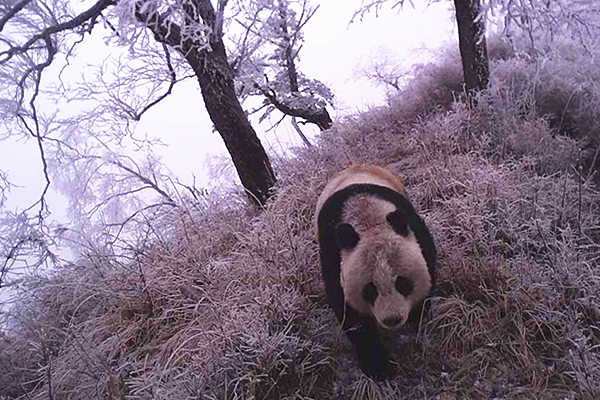Rangers devote their lives to guarding panda homeland
10-18-2018 09:59

LANZHOU - He Min has patrolled the giant panda habitat of Baishuijiang National Reserve in Gansu province for 16 years, but he has only had one encounter with a wild animal.
Covering nearly 184,000 hectares of mountain forest, Baishuijiang, which is China's largest giant panda habitat, is home to more than 110 wild giant pandas, 10 percent of the country's total.
The 38-year-old man is adept at walking on steep and slippery hillsides, where he observes and records signs of wild giant pandas. He also reports poaching activities and fire risks, and earns a monthly salary of 3,700 yuan ($540).
Every month, He and other rangers must camp in the wild for five days, changing the batteries of 260 infrared cameras that monitor the bears. They wear thick clothes to avoid scratches and mosquito bites.
China initiated a plan in 2017 to build a 27,000-square-kilometer national park for giant pandas across three provinces - Sichuan, Shaanxi and Gansu - to help the endangered animals move around more freely. Wild giant pandas have been found mainly in isolated mountain areas in the region. Baishuijiang is scheduled to be integrated with the park by 2020.
To rangers like He, this means even harder patrol work.
"Routine patrols start early in the morning and finish after the sun sets behind the mountains," He said.
His wife and two daughters live in the nearest town, Bikou. However, He can only visit them once a month or every other month, spending three to five days with them at a time. There is no paved road to the township, as the reserve is virtually cut off from the outside world to ensure the pandas are undisturbed by human activity. In 2016, He came across a wild giant panda.
"I was walking in the mountains as usual, when I suddenly spotted a panda eating bamboo just 20 meters away. I think it was a male. It was not afraid of me, and looked straight at me for about 10 seconds before walking away," he said.
He said it was a once-in-a-lifetime occurrence to come across a wild giant panda. There are 132 ranger in the reserve, and few have ever spotted one.
"I see this job as an honor," He said. "Without us, the giant pandas, our national treasure, could have lost their homeland forever."
As the son of two senior rangers, He was determined to do the same since childhood. After graduating from forestry school in 2002, he had no hesitation in seizing the opportunity to work in the Baishuijiang reserve.
"My mother always reminds me that I am from a family of rangers, and I should work more professionally than others," he said. "I always keep that in mind."
He has witnessed improvements in the environment in the natural reserve over the past years.
"Under our watch, there is almost no illegal activity, such as poaching or logging, in Baishuijiang," he said.
Before 2000, the giant panda population in Baishuijiang had dropped below 100 because of increasing human activity in the mountains.
There are 51 varieties of protected animal species, including giant pandas and golden monkeys, in the reserve. Since protection was tightened in 2000, the population of wild giant pandas has increased by more than 10 percent.
He considers his primary work is to train his younger colleagues.
"Many of the young foresters are fresh out of school," he said. "I encourage them to bear hardships and persist with the job."
END




